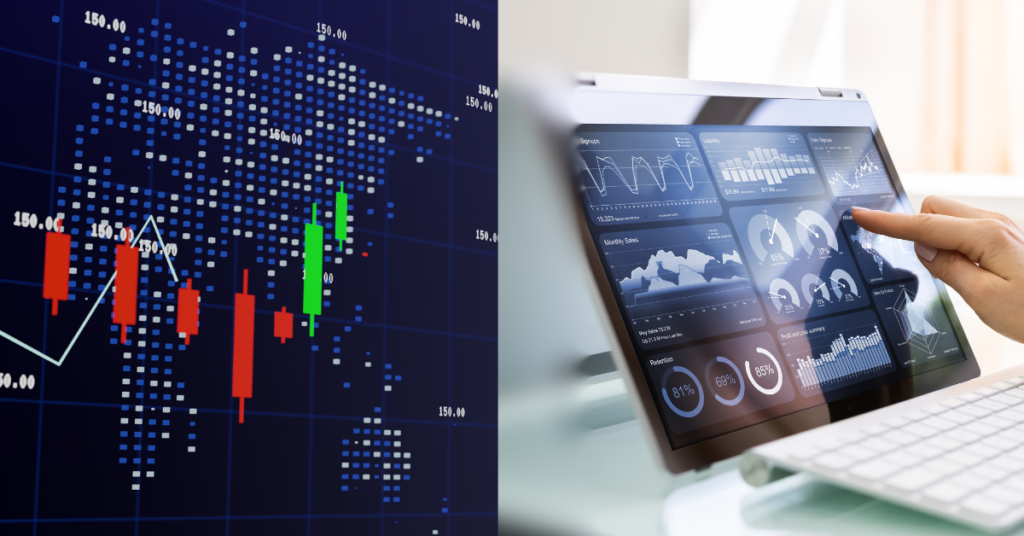Digital Marketing vs. Data Analytics: A Comparative Analysis for Career Aspirants

- Digital Marketing vs. Data Analytics- Understanding Digital Marketing
- Digital Marketing vs. Data Analytics-Exploring Data Analytics
- Career Opportunities in Digital Marketing
- Career Opportunities in Data Analytics
- Salary and Compensation
- Job Satisfaction and Work-Life Balance
- Educational and Skill Development Paths
The debate of digital marketing vs. data analytics often surfaces when it comes to career choices, presenting a crucial decision for many professionals. Understanding the nuances and potential of each field thus becomes a necessity as these can help shape your career path, and determine the skills you’ll develop, and the opportunities you’ll encounter.
This blog discusses the following:

- Understanding Digital Marketing
- Exploring Data Analysis
- Career Opportunities in Digital Marketing
- Career Opportunities in Data Analytics
- Salary and Compensation
- Job Satisfaction and Work-Life Balance
- Educational and Skill Development Paths
Digital Marketing vs. Data Analytics- Understanding Digital Marketing
Digital marketing harnesses online platforms for brand promotion. It involves strategies like Search Engine Optimization (SEO), content marketing, and social media engagement. Digital marketing is pivotal for reaching and engaging a modern audience. It also includes email campaigns and pay-per-click advertising, offering diverse tactics to connect with various audiences. In the digital marketing vs. data analytics debate, digital marketing stands out for its direct interaction with consumers.
Digital Marketing vs. Data Analytics-Exploring Data Analytics
Data analytics involves analyzing data for insights and is critical for informed decision-making in businesses. It encompasses techniques like predictive modeling and statistical analysis and is invaluable for understanding market trends and consumer behavior. Data analytics also plays a significant role in optimizing business operations and forecasting future trends, making it essential for long-term strategic planning.
ALSO READ: What is Digital Marketing? A Beginner’s Guide to the World of Digital Marketing
Career Opportunities in Digital Marketing
Roles and Responsibilities
1. Digital Marketing Manager
This role strategizes online marketing campaigns. It demands digital creativity and analytical skills and plays a pivotal role in driving a brand’s online growth and engagement.
2. Social Media Strategist
Social media strategists craft engaging social media content. They don’t just analyze social media trends but are also key in building brand presence. In fact, they adapt strategies to maximize engagement and reach.
3. SEO Specialist
SEO specialists optimize websites for search engines and enhance online visibility. Their role includes keyword research, improving organic search rankings, and implementing SEO best practices.
4. Content Marketer
Content marketers create compelling content and measure content performance. They require astute storytelling and marketing skills as these ensure alignment with marketing goals and the audience’s interests.
Industry Sectors and Job Demand
Whether healthcare or retail, digital marketing is integral to almost everything. Consequently, it offers diverse career opportunities. Digital marketing also drives user acquisition in tech startups. It enhances customer engagement, therefore, is crucial across all sectors.
Future Trends in Digital Marketing Careers
The digital marketing landscape is evolving rapidly, making adaptability crucial for professionals. In the digital marketing vs data analytics debate, staying ahead in digital marketing means embracing new technologies. You must also be well-versed in Artificial Intelligence (AI) and machine learning. Personalization in marketing is also gaining momentum. Thus, when considering which is better digital marketing or data analytics, one must note that a blend of both could pave the way for better job opportunities and innovation.
Career Opportunities in Data Analytics
Roles and Responsibilities
1. Data Analyst
Data analysts interpret complex data sets. They also identify trends and patterns and provide valuable insights into decision-making.
2. Data Scientist
This role involves advanced data analysis. Data scientists use predictive models to forecast future trends and behaviors.
3. Business Intelligence Analyst
Business intelligence analysts bridge data and strategy, turning data into business insights. They also create reports for stakeholders.
4. Machine Learning Engineer
They develop AI algorithms and are at the forefront of data processing. As a matter of fact, machine learning engineers play a crucial role in technological advancements.
Industry Sectors and Job Demand
Data analytics is vital across industries. From finance to healthcare, data analytics drives efficiency. Therefore, opportunities in this field are vast. In the digital marketing vs. data analytics spectrum, data analytics is essential for informed business strategies and its relevance spans multiple sectors.
Future Trends in Data Analytics Careers
Data analytics is rapidly advancing. Hence, continuous learning is key. In considering which is better digital marketing or data analytics, one must note the growing importance of big data and AI in analytics and why staying up-to-date with these trends is crucial. In the future, data analytics will be integrated with more technologies, making adaptability and continuous skill development essential.
ALSO READ: What is Data Analytics – Know Its Types, Applications and Career Opportunities
Salary and Compensation
Comparative Analysis of Salary Ranges in Digital Marketing and Data Analytics
In the digital marketing vs. data analytics debate, salary and compensation often play out as key differentiators. Therefore, understanding these aspects is crucial for career choices. Generally speaking, data analytics roles offer higher salaries due to their technical nature. They require more specialized skills than many digital marketing roles.
Factors Influencing Salary Levels
1. Experience
More experience means higher pay. Thus, career growth impacts earnings. When we compare digital marketing vs. data analytics, experienced data scientists and senior digital marketing managers often command higher salaries.
2. Geographic Location
Salaries vary according to where you are located. Moreover, regional economic factors also play a significant role. In tech hubs, data analytics roles may offer higher compensation, reflecting the cost of living and demand for these skills.
3. Industry Sector
Different sectors offer varying salaries. In industries such as finance or healthcare where data is key, data analytics roles may offer higher salaries than digital marketing roles.
Job Satisfaction and Work-Life Balance
Factors Contributing to Job Satisfaction in Digital Marketing and Data Analytics
In the digital marketing vs. data analytics debate, work-life balance plays a crucial role in job satisfaction. Job satisfaction in digital marketing often stems from creative freedom and campaign success. It appeals to those who enjoy creativity and interaction. On the other hand, job satisfaction comes from problem-solving and gaining impactful insights in data analytics. Hence, it suits those who value analytical challenges.
Challenges and Potential Stressors in Each Field
In digital marketing, constant changes in trends and platform algorithms can be stressors. Hence, adaptability is key. Data analytics professionals, in contrast, face stress when dealing with tight deadlines and complex data challenges. Therefore, resilience and problem-solving skills are essential here.
Work-Life Balance Considerations
Digital marketing professionals might experience fluctuating work hours due to campaign schedules. On the other hand, data analysts often have more predictable work hours but may face periods of intense project demands.
ALSO READ: The Ultimate Guide to 20 Digital Marketing Types for Aspiring Marketers
Educational and Skill Development Paths
Academic Qualifications for Digital Marketing and Data Analytics Roles
For digital marketing, degrees in marketing, communications, or business are common. On the other hand, data analytics roles demand degrees in statistics, computer science, or data science.
Certifications and Training Programs
In digital marketing, certifications in Google Analytics, SEO, and social media marketing prove beneficial. For data analytics, certifications in Python, R, SQL, and machine learning are valuable. In considering which is better digital marketing or data analytics, certifications and training programs play a pivotal role.
Continuous Learning and Staying Updated in Both Fields
Technologies and strategies are constantly evolving in both digital marketing and data analytics fields. Therefore, ongoing education is key to staying relevant. Moreover, professionals in digital marketing must stay abreast of changing algorithms and trends. Data analysts should keep up with the advancements in analytics tools and data processing technologies.
To conclude, if you want to dive deeper into the comparative analysis of digital marketing vs. data analytics and gain a sharp understanding of your career options, consider enrolling in Emeritus’s tailor-made digital marketing courses and enhance your prospects today.
Write to us at content@emeritus.org






